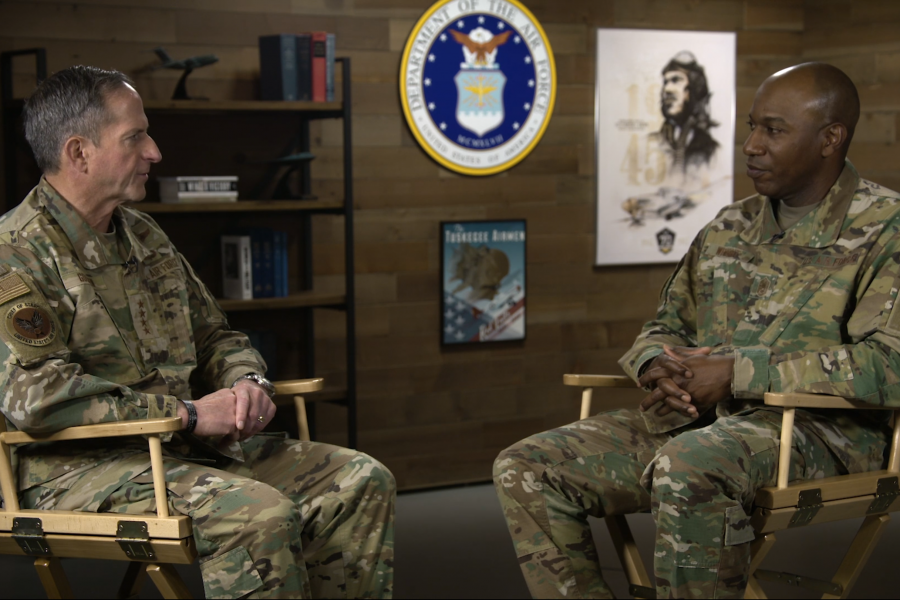The Air Force needs to have a sustained, uncomfortable, but important discussion about different life experiences to begin to address racial disparities across the service, the top uniformed Airmen said June 3.
Chief of Staff Gen. David Goldfein and Chief Master Sergeant of the Air Force Kaleth Wright hosted a two-hour virtual discussion June 3, taking a wide range of questions on racial biases within the service and across the nation. The current civil unrest sweeping the country is, to an extent, going on inside the Air Force and members of the service need to start talking with each other to broaden their perspectives, they said.
“We’ve got to have the difficult conversations that produce a greater understanding of each other inside our Air Force, where we are a profession of arms, where everybody matters, everybody’s valued, and everybody’s background is important,” Goldfein said.
The Facebook discussion came after Wright and Goldfein released letters to the Air Force detailing their thoughts on the rising racial tensions sweeping the country after the Memorial Day death of George Floyd, a black man, at the hands of white Minneapolis police officers. The ongoing situation has prompted the Air Force to launch a review of its military justice system and the lack of diversity in its highest ranks. Importantly, it shows a need for leaders to create an environment where Airmen are comfortable to talk about their backgrounds and experiences.
“Prepare for anger, some sadness, some rage,” Wright said about these conversations. “Don’t be thrown off by the emotions that this might dig up, that you may not see coming. Allow people to express themselves.”
Airmen participating in the discussion asked what resources are available to them, how the service can better recruit minority groups, and how to deal with others who may be close-minded.
“For some, this won’t be enough to change their opinion,” Wright said. “But, I think with constant education and persevering through it and having some grace, people can change.”
The Air Force can’t just set in place individual steps, with deadlines, and say that is enough, Goldfein said.
“If we tried doing one or two things, and think we’re going to get better, I don’t think we’re taking this seriously,” he said.
Wright said he and Goldfein are taking responsibility in making sure leaders are held accountable in how they, for example, promote and treat their Airmen. The two of them need to hold themselves accountable in making sure this discussion continues in the future.
“This is a commitment to a campaign, a long-term focused effort on better understanding each other, a better understanding of what some of our teammates have been living with their entire lives, and ensuring that we make the meaningful change that we have to as a profession of arms,” Goldfein said.
Wings and commands across the Air Force have held their own discussions as well. The commander of 52nd Fighter Wing, Col. David Epperson, used a virtual COVID-19 update on June 3 as an opportunity to address George Floyd’s death “and all that is wrapped up in that.”
“In the United States, as well as in our Air Force, it’s truly sad, and angering emotions … come out, I think for a number of us, and each one of us is going to deal with and process this in a different way,” he said. “What it highlights, though, is that there is still inequality, and there are prejudices and perceptions that just simply cannot be tolerated. And these are things that we need to continue to work on, both here in the Air Force, as well as in our nation. And we’re gonna tackle those things, head on.”
He acknowledged that these issues can’t be fixed overnight, but pledged to “work towards a better culture of inclusion and inequality,” and announced plans to hold small-group working sessions “throughout the wing” to achieve that end. Epperson also invited his Airmen and their families to take part in a June 4 moment of silence at 10:52 a.m. in front of the wing’s headquarters building. He requested the use of masks and physical distancing, and said a parking lot would be cleared to accommodate the crowd.
“Really, it’s an opportunity for us to start to heal together as Saber Nation,” he said.


